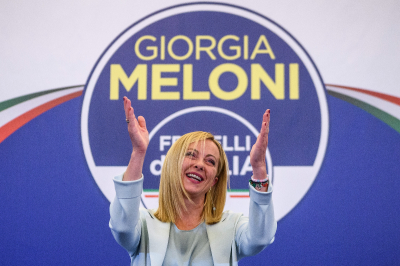Living as earthly and heavenly citizens

Though Italian politics does not typically dominate English-speaking Twitter, a speech by Giorgia Meloni, expected to soon become Italy’s first female prime minister, recently caught the attention of a great many around the world.
The speech was from 2019. In it, Meloni decried the practice of commercial surrogacy, rebuked the heedless rush to chemically castrate teens with gender dysphoria, praised the natural family as the basis of society, called out the evils of euthanasia and abortion, and defended her identity as not just a citizen of the world but as someone both Italian and Christian. She closed with a quote from G.K. Chesterton, one of many predictions he made that has come true: “Fires will be kindled to testify that two and two make four. Swords will be drawn to prove that leaves are green in the summer.”
It was refreshing to hear classical truths of Western civilization defended with such passion. Many political and cultural conservatives, both in America and around the world, praised her, holding up her words as a model of what it means to resist progressivism’s continued march across institutions. Many media outlets, on the other hand, quickly labeled her “far right,” “nationalist,” and even “fascist.”
Most of these critiques can be dismissed with ease. After all, it’s not uncommon for journalists to describe anything or anyone not fully on board with progressive ideologies as “far right,” the mildest expressions of patriotism as “nationalist,” and any conservative ideal as “fascist.” Multiple news agencies have noted that Meloni’s political party has roots in the remnants of Italy’s Mussolini era, a level of scrutiny most political parties would not survive.
Other critiques, however, were more substantial. Italian politics is notoriously unpredictable, averaging a new administration every 13 months since 1945. So, it is not unheard of for radical parties, both left and right, to hold seats in the Italian parliament. Nor is it hard to find examples of Christian jargon and imagery employed to support policies and actions that are unhealthy, unchristian, and immoral.
Meloni’s example is even more interesting in light of Queen Elizabeth II’s openly Christian and openly national faith. How can these dual loyalties, to Christ and to nation, blend? How does our earthly citizenship interact with our heavenly citizenship?
Wrestling with these questions, the late writer Richard John Neuhaus once said,
“When I meet God, I expect to meet him as an American.” You can imagine the response his remark elicited, but Neuhaus was not claiming that being an American was the only or most important thing about his identity. Only that it mattered, because it does. As he put it, “Among all the things I am or have been or hope to be, I am undeniably an American. It is not the most important thing, but it is an inescapable thing.”
God did not create generic people with shapeless identities. Just as our personalities, hair color, families, and other characteristics make up who we are, so does our time and place. While there is no biblical warrant to call any nation “Christian” since the days of ancient Israel, there’s plenty for living fully as Christians as citizens of our nations. Our cultural and national identities are part of that great train of treasures that the kings of the Earth will bring into the heavenly New Jerusalem. Until that time, just as we strive, in God’s power, to rid ourselves of sin, leaving only the best of us for God’s service, so too we should work to strip from our nations all corruption and evil, through love of neighbor and repentance, until only the best of being American (or Egyptian, or Japanese, or whatever nation to which God has called us) is left to present to the King of all the nations.
Originally published at BreakPoint.
John Stonestreet serves as president of the Colson Center for Christian Worldview. He’s a sought-after author and speaker on areas of faith and culture, theology, worldview, education and apologetics.
Timothy D. Padgett (PhD) is the Managing Editor of BreakPoint.org with the Colson Center for Christian Worldview. His focus is on cultural engagement, living out the Christian worldview, and the way Christians argue for diverse viewpoints while sharing a common biblical foundation?particularly regarding the relationship between church and state, Christ and culture, and war and peace.




















